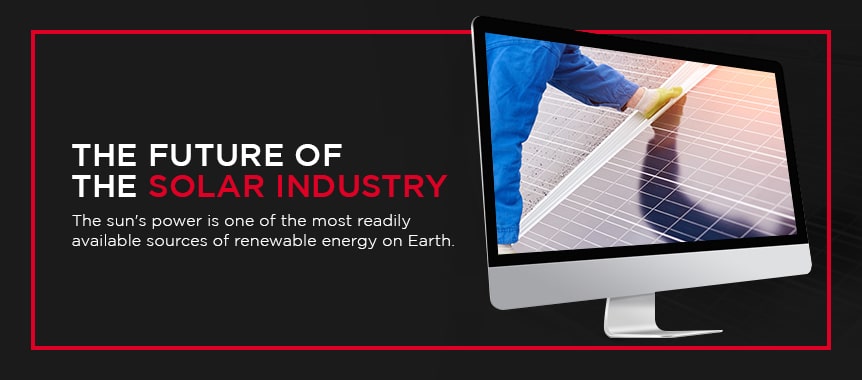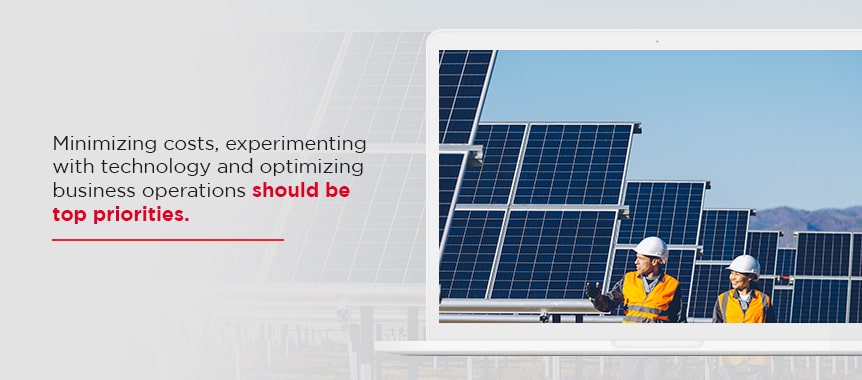
The sun’s power is one of the most readily available sources of renewable energy on Earth. Solar continues to be the fastest-growing renewable energy source, offering excellent future potential. With emerging net-zero emission goals and increasing sustainability regulations, that growth should continue. The future of solar energy is promising.
Though solar power future projections indicate growth, solar panel contractors will have to work hard to keep up. To stay on top in this evolving industry, contractors will need to maximize their project efficiency, output and other day-to-day operations. Staying competitive will require solar technology advancements in sourcing, transportation and installation.
How Is the Solar Industry Growing?
The solar market continues to expand, driven by technological developments in efficiency and popular demand. Not long ago, solar energy harvesting was virtually non-existent. The process was expensive and inefficient, and motivating incentives were scarce. Today, improved technology, decreased costs and government incentive programs are driving the industry forward. Between the years 2000 and 2019, solar power collection increased over 300-fold. The current social and political landscape should encourage more solar production.
How much the industry will grow depends on many factors. Even with a supportive government and social community, the industry is not without challenges. How solar contractors rise to demands will determine the future of the solar power industry.
Political Landscape Factors
Changing political landscapes have a major influence on alternative energy production. Government priorities impact which markets grow and at what speed they grow. Incentive programs and government investments can affect a market — policies like these can make research and development possible or support expansion.
President Biden’s administration is spearheading what they call a “clean energy revolution” in response to the worldwide climate emergency. The main objective of this plan is for the United States to reach net-zero emissions by 2050. This and other objectives will have a marked impact on alternative energy producers and distributors.
As part of this climate plan, Biden has promised to invest in clean energy research and innovation. He has also promised to provide economic incentives for expanding clean energy. These changes may make future solar energy more accessible and widespread, but they may also increase competition for existing solar contractors.

Costs, Challenges and Market Demands
No expanding industry is immune to growing pains. Solar energy is no exception. Increasing demands come with new sets of challenges. The solar industry outlook is hopeful, and there are many opportunities for growth and change. With developing technological advancements, it’s more important than ever for solar contractors to keep up.
Minimizing costs, experimenting with technology and optimizing business operations should be top priorities. It’s also important for contractors not to rely too heavily on fleeting government programs and incentives. The solar energy market faces several cost and demand challenges.
Hard Costs Decreasing
In general, the costs of harvesting and utilizing solar energy have declined as technology has improved. Hard costs are decreasing, including the costs of the physical solar cell components. This is because material costs have declined and technological advancements have led to more efficient solar cells. On the other hand, soft costs have remained a concern. Soft costs include labor, inspection, customer acquisition and overhead. Customer acquisition costs have risen, while inconsistent building codes and permitting policies cause unpredictable expenses.
Members of the solar industry have to iron out any inefficiencies to remain competitive in this market. Staying at the forefront of new technological advancements can make or break a solar production enterprise. Contractors who embrace new technology and innovate their installation methods will have the most success in the coming years.
Work Volume Increasing
Increasing demand means a greater work volume. Solar companies need to develop methods for larger operations in terms of production, transportation and installation. The more efficiently a company can receive, distribute and install solar panels, the more they’ll benefit from the industry’s growing market. For contractors to keep up with evolving demands, improving organization and efficiency will need to be top priorities.
Government Incentive Reliance
A notable concern for the solar energy market is reliance on government programs. Political landscapes change, and incentives available now may not be available in the future. It’s important for solar companies to take advantage of government programs while they’re available without growing reliant on these funds and to use any extra funds to develop more efficient processes.
As of 2021, those who invest in solar and solar energy storage could claim a substantial tax credit. This solar tax credit sparked much of the industry’s growth, but it expires in 2022. The loss of this tax credit poses a challenge for solar energy contractors. They’ll have to find new ways to incentivize solar energy for prospective clients. This is a great time for solar installers to reflect on their business models and propose new ideas.

How the Solar Industry Provides More Opportunities for Contractors
Current energy trends promise many opportunities for contractors. There’s plenty of room for technological advancements in solar panel creation, installation and energy storage. There’s also room for improvement in solar energy business operations. Taking advantage of emerging opportunities will poise a contractor for success in this evolving industry.
Creating More Efficient Panels
Improving solar panel efficiency would help reduce costs and increase solar’s accessibility. Fewer panels would need to be installed if those panels were better optimized. Since the introduction of solar, technological advances have led to substantial efficiency improvements — those improvements should continue. This presents an important opportunity for contractors. Accessing the most efficient panels provides contractors a competitive edge in the growing solar market.
Optimizing Energy Storage Systems
The energy storage market is growing more each year, with new investments projected to reach $620 billion by 2040. Solar energy storage is a niche with a lot of potential. Consumers are looking for more personalization capabilities and grid independence. Combining solar power with smart home technology and better storage capabilities makes solar even more attractive for consumers. This area of the alternative energy market offers many opportunities for advancement.
Incorporating User Personalization
Another important trend is the push towards personalized energy solutions. Smart technology is attractive because it can learn and accommodate individual preferences. It also allows users more insight into their energy use and storage. In the coming years, contractors who combine solar with smart technology may be able to claim a larger market share.
Improving Business Operations
With the growing industry comes many opportunities for improved business operations. As work volume increases, contractors should optimize day-to-day processes to stay competitive and prepared for growth. This might include using service management software like Dataforma to organize and streamline projects. With software systems, contractors can capture important information, document work orders and organize schedules more easily. This can help them identify bottlenecks or other pain points for a smoother, more efficient operation.

Innovate Business Operations With Dataforma
Solar energy is an evolving industry and an increasingly competitive market. As demand for solar energy rises, contractors have to adapt to the rising work volume. The most organized and efficient contractors will prevail. Now is the best time for solar contractors to be proactive and prepare themselves for market growth.
If you’re a solar energy contractor looking to optimize your operation’s efficiency, you might consider using Dataforma service management software. With Dataforma, you can consolidate and streamline all of your business management. You can keep track of your leads, bids, proposals and documents. With our secure database, you can store all of your records, data, photos and client conversations. To see what Dataforma has to offer, schedule a free 15-minute demo today.









